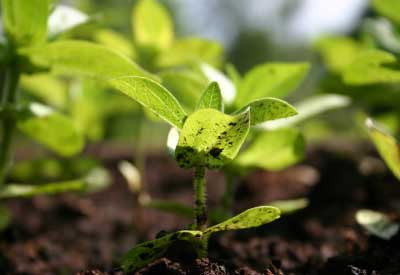Why not use synthetic fertilizers? It’s a reasonable question. After all, nitrogen, phosphorus, and potassium ARE chemicals, so where is the advantage in these bags of heavy, grainy stuff, that need to be measured and mixed and then dug in, when you can just pick up a small plastic bottle of the blue stuff?
There are several organic fertilizer benefits, some purely altruistic, others much more self-interested. First of all, most inorganic fertilizers provide only that well-known trio, nitrogen (N), phosphorus (P), and potassium (K). These three, known as the macro-nutrients, are indeed required in greater quantity than any others, but they are only three of the thirteen nutrients plants need. The three chemicals that qualify as secondary nutrients, calcium, sulfur, and magnesium are generally ignored, as are the trace nutrients, boron, chlorine, manganese, iron, zinc, copper, and molybdenum. While these are needed in far smaller quantities than the macro-nutrients, they are still essential.

OMRI LISTED
Organic Fish & Seaweed (2-3-1)
Use on a regular basis for bigger crops, increased sugars and better blooms.
Learn morePlanet Natural carries a large variety of natural and organic fertilizers designed to encourage growth, blooms and bountiful harvests. Give them a try… your gardens will perform beyond your highest expectations!
This might not matter if plants could just get these other nutrients from the soil, and this is indeed what usually happens. But over time, and in several ways, chemical fertilizers can interfere with plants’ ability to take up nutrients.
For one thing, pure chemicals can be hard on the earthworms and micro-organisms in the soil that keep it alive and working, thus making nutrients available to plants (see Effects of Organic and Chemical Inputs on Soil Quality). Earthworms not only provide perhaps the best compost available, but they also help aerate soil when they tunnel through it. Without them, soil becomes increasingly compacted, unless deeply cultivated — which is also bad for them and for soil structure. Without the beneficial effects of worms and micro-organisms, plants have a harder time accessing the secondary and micro-nutrients not found in most chemical fertilizers.
Chemical fertilizers can be equally hard on plants themselves, because they bypass the work a plant normally has to do to gain access to nutrients. One source compares it to being fed intravenously; over time, the digestive tract will grow weak from disuse. Pure chemicals will make soil less nutritious, and lessen the plants’ ability to access nutrition. Both soil and plants therefore become increasingly dependent on the chemical fertilizers (see Down On The Farm? Yields, Nutrients And Soil Quality).
That dependency is augmented by the quick-release action of chemicals. Since most chemical fertilizers for small gardens come in a purified, liquid form, they generally give plants a major but short-term boost, followed by a sharp drop-off in the supply of nutrients. That sudden decrease is of course hard on plants, so growers tend to relieve it by providing another dose — and another.

Finally, chemical fertilizers are hard on the environment. Many are synthesized from oil, their production requires a significant investment of fossil fuels, and when they run off into streams or lakes, they can cause further problems. Algae blooms (the sudden growth of underwater plants) encouraged by agricultural run-off can consume oxygen needed by fish and other organisms. Fertilizer that leaches down to the water table may cause more direct threats to human health. Read more about the environmental effects of chemical fertilizers here.
This isn’t just a healthy dose of the usual NPK for your garden. Down-To-Earth® Bio-Live Fertilizer combines a special mix of plant nutrition with beneficial bacteria and mycorrhizal fungi to make sure your plants are covered from leaf tip to root hair. Available in a 5-lb. box.
Organic fertilizers, far from being purified and simplified chemicals, are complex compounds that add numerous secondary and micro-nutrients beyond the one or two for which they are best known. Organics such as manures, powdered rocks (such as lime, rock phosphate, and greensand), blood meal, bone meal, wood ash and compost all contain important micronutrients, and their texture will improve soil quality rather than degrading it.
It would be stretching things to pretend that organic fertilizers cannot damage plants or the environment. Sprinkle blood meal directly on your basil, and watch the leaves turn black next time the sun comes out. On a larger and more relevant scale, manure runoff can and does cause algae blooms and can make water unfit to drink. Production of rock fertilizers — gypsum, greensand, lime and the rest — involves mining and milling, which in turn require fossil fuels. However, the ecological damage done by producing organics, either at present or potentially, does not approach that done by synthetics.
Organics, then,
- contain important secondary and trace nutrients;
- improve soil texture, aeration, and drainage;
- provide slow-release nutrition;
- aid the environment in many ways and harm it in few.











